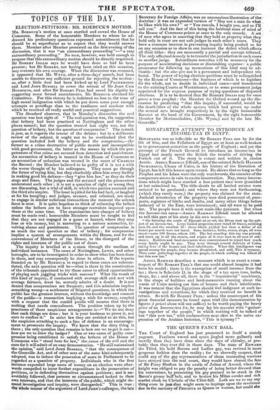BONAPARTE'S ATTEMPT TO INTRODUCE AN INCOME-TAX IN EGYPT.
BONAPARTE was as inflexible as Sir ROBERT PEEL can be for the life of him, and the Fellaheen of Egypt are at least as well-broken in to government-extortion as the people of England ; and yet the attempt of the French General to introduce an income-tax in Egypt had nearly saved the British the trouble of driving the French out of it. The story is extant and written in choice Arabic. ABDUL RAHMAN Effendi, son of the sainted Scheik Hassan( DSCHARBETI, Ulema of Cairo, in his history of the liberation of Egypt, has left this lesson upon record. He shows that so long as the Prophet and his Islam were the only watchwords, the enemies of the conquerors strove in vain to excite insurrection. Nay, many innova- tions which might have startled a less patient race were grumbled at but submitted to. The title-deeds to all landed estates were ordered to be produced; and where they were not forthcoming, (which they rarely were,) the property was claimed for the state. Judicial inventories of the property men died possessed of, pass- ports, registers of births and deaths, and many other things before 'unheard of in the East, were introduced ; and all were to be paid for. The people bore it with most mule-like patience. But when the Income-tax came—ABDUL RAHMAN Effendi must be allowed to tell this part of his story in his own words- " On Saturday the tenth of Djemari-ul-er-vel, the Divan took up the sub- ject of an income-tax. Large landed properties were taxed 48 francs, middling ones 36, and the smallest 18: those which yielded less than a dollar of six francs per month were not taxed. Inns, factories, baths, stores, shops, all were taxed—some 180 francs, others 240. The law enacting this tax was printed, and stuck up in all the streets, and copies of it were sent to all men of sub- stance. Builders and land-measurers were commissioned to report how much every family ought to pay. They went through several districts of Cairo, taking lists uf the houses and their inhabitants. When this intelligence was spread among the people, they became dissatisfied, and said, This is tyranny. Then came gatherings together of the people, in which nothing was talked of but this new tax."
ABDUL RAHMAN describes a measure which is so exact a coun- terpart of Sir ROBERT PEEL'S that one could almost imagine it had been his model : there is the exemption of small incomes from the tax ; there is Schedule D, in the shape of a tax upon inns, baths, shops, &c.; and above all, there is the "inquisitorial" machinery, in the shape of builders and land-measurers running about the wards of Cairo making out lists of houses and their inhabitants. It was natural that the Egyptians should feel indignant at such in- vestigations and extortions, for which they received no benefit in return. So with Sir ROBERT PEEL: unless the counterpart of his great financial measure be found upon trial (for demonstration by figures a priori alone will not suffice) to be worth paying the heavy price of an Income-tax for, he may lay his account with "gather- ings together of the people," in which nothing will be talked of but "this new tax," with exclamations near akin to the naive ex- pression of the Arabian historian, "This is tyranny !"


























 Previous page
Previous page